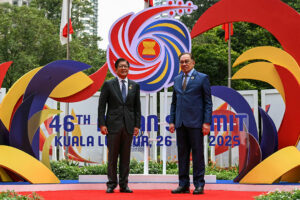Marcos backs ASEAN consensus to avoid retaliation against US
PHILIPPINE President Ferdinand R. Marcos, Jr. on Monday welcomed the consensus of the Association of Southeast Asian Nations (ASEAN) to avoid retaliatory actions against the US, which slapped so-called reciprocal tariffs on its trading partners.

By Chloe Mari A. Hufana, Reporter
PHILIPPINE President Ferdinand R. Marcos, Jr. on Monday welcomed the consensus of the Association of Southeast Asian Nations (ASEAN) to avoid retaliatory actions against the US, which slapped so-called reciprocal tariffs on its trading partners.
“We commend Malaysia’s leadership in convening the Special ASEAN Economic Ministers’ Meeting and welcome the consensus to avoid retaliatory measures,” Mr. Marcos said during his intervention at the 46th ASEAN Summit in Kuala Lumpur, Malaysia.
Mr. Marcos said the regional bloc’s commitment to a unified, rules-based response reinforces economic stability amid increasing geopolitical and trade uncertainty.
“This measured and unified approach upholds ASEAN’s commitment to dialogue, diplomacy, and a rules-based multilateral trading system,” he added.
The two-day ASEAN summit began on Monday amid heightened global market volatility arising from the Trump administration’s tariff threats.
Several ASEAN countries face higher-than-expected US tariffs, ranging between 32% and 49%. These tariffs could be imposed starting July unless these countries successfully negotiate lower tariffs with Washington.
The Philippines was slapped with a 17% tariff, the second-lowest tariff among ASEAN members.
Mr. Marcos said the regional bloc must continue to prioritize sustainable and inclusive growth even as geopolitical and economic pressures mount.
“Geopolitical tensions, unexpected trade barriers, and the unprecedented impact of climate change have the potential to disrupt our communities and supply chains and remove our hard-earned progress,” he said.
“Yet, by working together, strengthening our institutions, and building the resilience and capacities of our people, we can better navigate this increasingly uncertain future and turn challenges into opportunities for shared growth and stability,” he added.
ASEAN has increasingly positioned itself as a stabilizing force amid rising protectionism and US-China tensions.
The region’s collective gross domestic product (GDP) stood at $3.8 trillion in 2023, according to the ASEAN annual report. While the region ranks as the third-largest trading bloc globally, with total trade reaching $3.5 trillion.
The unified ASEAN response is a pragmatic one, said Francis M. Esteban, associate dean at the Far Eastern University’s Institute of Arts and Sciences.
“[Because] it is easier to build consensus among its member-states on this rather than retaliating against the US,” he said in a Messenger chat.
Retaliating against Washington might cause more disruption, he said, noting that the US was ASEAN’s largest source of foreign direct investments and the second-largest trading partner in 2024.
“This gives more certainty to the business sector since retaliatory tariffs often lead to further retaliations from the other party,” Mr. Esteban added.
“In a way, this is also ASEAN’s way of saying that it is open to strengthening its partnerships and engagements with other economic actors aside from the US,” he added.
However, a unified non-retaliatory stance against the tariffs may be a “tricky thing,” according to diplomacy lecturer at the De La Salle-College of St. Benilde, Josue Raphael J. Cortez.
“This is because retaliation — economically speaking — is an inevitable phenomenon in geoeconomics,” he said in a Messenger chat. “This may be viewed by other members of the global village as an exemplification of our surrender towards more powerful economies.”
For Mr. Esteban, the number one risk of a unified approach is how the 10 ASEAN members would defend their economies and shield consumers from the tariffs imposed by Washington.
“However, the opportunity really lies in diversifying economic partners,” he noted. “Trump is trying to challenge the rules-based order that the US has championed for so long, which I think many states benefited [from] and would want to see stay the same way.”
If the regional bloc remains firm in its commitment to non-retaliation, a free trade agreement with the world’s largest economy may thrive, Mr. Cortez said. He added the US could also possibly lower the reciprocal tariffs on individual ASEAN countries.
“As the US is eyeing Southeast Asian markets as alternatives to source the things China has offered it for the longest time, a non-retaliatory stance may be the more viable option at this point,” he added.
According to Mr. Cortez, the ASEAN consensus is among the primary pillars guiding the region’s dynamics, calling it an integral part in navigating trade and economic challenges.
“The majority of ASEAN members are developing — this has already been acknowledged by ASEAN leaders — hence, working collectively to ascertain that the negative repercussions of retaliatory tariffs would not impede the growth of ASEAN states is paramount,” he said.






















